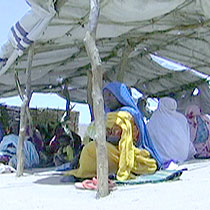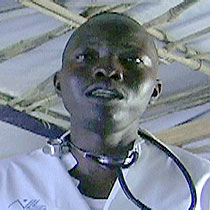2007年VOA标准英语-Chad's Violence Strains Health Clinics(在线收听)
Dakar
06 August 2007
In eastern Chad, violence along the Sudanese border has forced more than 100,000 Chadians into camps. Clinics run by international agencies try to contain and treat diseases that circulate in often waste-infested tight living conditions. Phuong Tran visited a clinic 80 kilometers from the Sudanese border and reports on the difficulties in providing health care to those who need it.
 |
| Waiting for health care service |
Too many people and too few health care staff mean only about 10 percent of Chadians fleeing violence have access to health care.
Patients wait in more than 40 degree (Celsius) dry heat to hear their names.
Badradina Abdoulaye enters the hot tent with her five-month-old baby. "My baby has been up all night with a fever and diarrhea," she says.
Bedeness Phares, a 32-year-old Chadian nurse, examines the still feverish child and decides he has a respiratory illness. Phares writes in the woman's small yellow health booklet given to Chadians when they enter the camp.
The next patient arrives with uncontrollable itching. Describing the symptoms, the patient says, "My whole body feels like fire. I also have pains in my stomach."
 |
| Nurse Bedeness Phares |
"People squeezed into the camps are exposed to so much that breathing, stomach and skin problems are common," Phares said.
Hours into the day, the nurse still faces a pile of health records for patients outside the clinic. The next one is an 18-year-old early into her pregnancy.
She tells him, "I suddenly started bleeding last night. I do not know what happened."
After a quick exam, nurse Phares says he wants the young woman to go immediately to the hospital. The patient expresses her difficulty, "I know it might be serious, but I cannot go to the hospital until I find someone to watch my two children at home."
The nurse lets her go, but he writes she needs more care. Like so many of his other patients, the nurse knows the young woman may not come back.
Before he can answer the walkie talkie announcing more patients in surrounding camps, the nurse must first get to the ones still waiting outside.